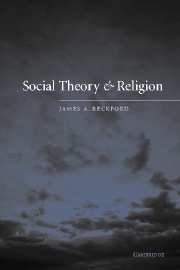6 - Constructing religion, self and society
Published online by Cambridge University Press: 18 December 2009
Summary
I have made few attempts in this book to highlight themes that cut across, or run through, the topics of secularisation, pluralism, globalisation and religious movements. This is because my first priority was to indicate in detail the variety of ways in which social theorists have dealt with these particular aspects of religion and how specialists in the social scientific study of religion have theorised their work on them. There are very few studies of the interplay between these two sets of interests. My aim has therefore been to identify ways in which both social theory and social scientific studies of religion could benefit from greater exposure to the issues that each of them raises about the other.
The general framework within which I have presented the theoretical and analytical issues is social constructionism. This is a perspective that gives priority to questions about the processes involved in negotiating the meaning of social phenomena. It deploys systematic scepticism towards ontological claims about ‘reality’, preferring to study the means by which such claims are mounted, modified and challenged in everyday social life In relation to religion, then, a social constructionist approach tries to discover how terms such as ‘religion’, ‘religious’, ‘sacred’ and ‘spiritual’ are used; how the usage varies across different categories of people, time and space; how it reflects collective interests; how human actors justify their usage of these terms; how social groups and organisations institutionalise the usage; and how social agencies try to regulate the activities to which the terms are applied.
- Type
- Chapter
- Information
- Social Theory and Religion , pp. 193 - 215Publisher: Cambridge University PressPrint publication year: 2003



